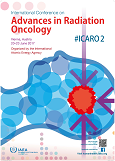Speaker
Kin Yin Cheung
(International Organization for Medical Physics (IOMP))
Description
Introduction
Medical physicists practicing in clinical environment, as defined by IOMP and in IAEA International Basic Safety Standards 2014, are health professionals with education and specialist training in the concepts and techniques of applying physics in medicine, competent to practice independently in one or more of the subfields of medical physics. The need for medical physicists and their important roles and responsibilities in radiation oncology are well defined by IOMP and in IAEA Human Health Series No. 25. Medical physicists practicing in radiotherapy are key members of an interdisciplinary team in the radiation oncology department dedicated to providing safe and effective treatment of cancer. Their ability and performance has a direct impact on the quality and safety of the radiotherapy services. Hence, they should be well qualified with professional knowledge and competence and be able to apply appropriately and effectively the principles of radiation physics in the clinics and to make major contribution to radiotherapy service. IOMP advocates the need for medical physicists practicing in medical institutions be qualified by going through an appropriate system of education, professional training and professional accreditation in a similar manner as other health professionals. IOMP also advocates the need for all medical physicists in different parts of the world to be qualified in a similar manner and practicing with the same standard of professional competency. The work of the IOMP pertaining to maintaining a high standard of practice by the medical physicists across the world is described in this presentation.
Methodology
A global uniformity in standard of practice of the medical physicists is important in the battle against cancers as this ensures that all patients can receive safe and effective treatments. To achieve this objective, there is a need to apply and maintain equivalent standard of education, training and professional development for medical physicists in different countries. Unfortunately, as reported by IAEA Human Health Series No. 25, there is a large variation in the requirement and format of education and training for medical physicists from different countries. Although, guidance on education and professional training of medical physicists has been issued by IAEA and IOMP, formal education and clinical training of medical physicists are yet to be established in many countries.
IOMP in collaboration with a number of its member organizations established an international system of professional certification, the International Medical Physics Certification Board (IMPCB). Medical physicists certified by the IMPCB for instance in radiation oncology physics are considered qualified to practice independently in this sub-fields of medical physics. IOMP considers it more appropriate for medical physicists to be certified by their own national certification board as this could incorporate in the certification examinations country specific requirements and characteristics, such as local regulatory requirements, country specific clinical practice, and national language. Instead of certifying the individual medical physicists, IMPCB conduct accreditation on national certification boards. Only in situations where formation of national certification board is impractical, e.g. due to small number of practicing medical physicists, that IMPCB may consider certifying individual medical physicists. In addition, IOMP recommends that medical physics education and training programmes be subject to independent accreditation or audit. Such activities exist in a number of developed countries, but do not exist on international level. The Organization has established an Accreditation Board for accreditation of medical physics education programme. The Board has completed a pilot accreditation on established programmes. Full implementation of the accreditation programme will soon be launched, what will greatly help maintaining the medical physics educational standards in many small countries. IOMP is also considering to set up in future an Accreditation Board for audit of medical physics clinical training programmes.
As stated in its Policy Statement No. 2, IOMP considers continuing professional development (CPD) an essential part of the professional credential of the medical physicists. The quality of the CPD programme on offer to medical physicists by a national organization is evaluated during accreditation of national certification board.
Conclusion
In an attempt aiming to improve the standard of practice of the medical physicists to better support radiation therapy service and other medical physics activities on a global basis, an international system of quality audit on standard of education, training and professional practice of medical physicists is being implemented by IOMP. The audit system consists of three parts, namely, (1) professional certification of medical physicist and this has already been implemented by IOMP in collaboration with IMPCB; (2) accreditation of medical physics education programmes and a pilot run of this has been completed by IOMP; and (3) accreditation of medical physics clinical training programmes, a future task of the IOMP. These audit programmes will likely have significant positive impact on standard of practice of the medical physicists and quality of radiation therapy service across the world.
| Country | International Organization for Medical Physics |
|---|
Author
Kin Yin Cheung
(International Organization for Medical Physics (IOMP))
Co-author
Slavik Tabakov
(IOMP)

